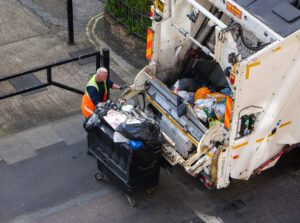The United Kingdom is facing an epidemic of fires associated with the improper disposal of batteries and the ESA has today (Monday 15th September 2025) published a policy briefing report setting out the challenges and potential solutions for reversing this worrying trend.
The policy briefing document is available to view and download in the ESA’s Media Library and in the ESA Members’ Area.
Six billion batteries were thrown away across the UK last year (or approximately 3,000 every minute). Of these, 1.1 billion were hidden in discarded electrical devices like electric toothbrushes, razors, mobile phones and electronic vapes.
When batteries, or devices containing them, are incorrectly discarded with general rubbish or other conventional recycling, they present a serious fire risk during the handling and onward processing of this waste material.
The National Fire Chiefs Council (NFCC) reports that there were more than 1,200 battery related fires occurring in refuse vehicles or waste facilities over a 12-month period between 2023/24 – which is a 71% increase in similar incidents from the preceding 12 months. Without intervention, this figure is expected to rise exponentially as successive generations of electronic devices containing ever-more powerful batteries reach the end of their working life.
A national YouGov poll for the ESA in 2023 found that nearly a fifth of UK consumers admit to binning batteries, while a separate national poll in 2023, conducted by Yonder, found that the majority of UK consumers reported that they did not feel confident about how to safely dispose of batteries or electronic products containing them.
Aligned with a rapidly rising incident rate, there has also been staggering growth in the costs associated with battery-related fires, from £150 million per annum in 2021 to over £1 billion today. This billion-pound-a-year problem is expected to persist without significant and systemic intervention to stem the tide of batteries and electronic devices entering the wrong waste streams.
Executive Director of the ESA, Jacob Hayler, said: “Waste fires caused by batteries not only endanger the lives of people working in essential frontline services but also destroy vital infrastructure; threaten the natural environment and undermine the vitality and viability of businesses involved in the UK’s circular economy – placing jobs and future investment at risk.
ESA members have invested millions in safety measures to mitigate battery fires and limit the potential for damage, but the risks posed by carelessly discarded batteries are best addressed at the point of disposal. This requires an urgent systemic shift in the post-consumer management of batteries and devices containing them, driven by new policy and regulation. The current collection system for Waste Electricals and Electronic Equipment (WEEE) and waste batteries is clearly inadequate for safely dealing with the proliferation of these items today, let alone into the future, which is why the ESA is calling on policy-makers to implement universal, producer-funded, kerbside collections for batteries and small waste electrical across England. Doing so would make it easier for consumers to dispose of these items correctly and this in turn could increase capture rates and reduce the fire risk.”




